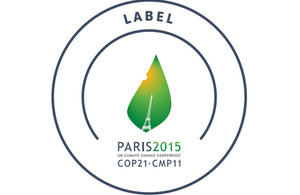COP21: How the OECD added value
The OECD plays a key role in facilitating dialogue and providing analysis in the run up to COP21.

COP21 logo
After two weeks of intense negotiations, an agreement to tackle climate change was reached last Saturday in Paris. The Paris Agreement saw an unprecedented number of countries, including the world’s largest emitters, committing to act collectively to reduce emissions and fight climate change. The UK has shown leadership throughout the process by being active in the negotiations, in its national decarbonisation commitments, and in raising support for the world’s poorest to better withstand weather extremes and rising temperatures.
The Agreement has aligned public and political will to other pledges made during COP 21, signalling that the world will decarbonise and businesses will adapt. A clean energy-based business model is no longer an option but a necessity for firms that want to survive in a low-carbon world. Firms have already understood this new scenario and are mobilising to find solutions and implement change. Large groups have announced that they will reduce their environmental and carbon footprints, act to decarbonise their investment portfolios and finance smarter risk and resilience projects.
Cities and regions have joined together to take climate action, with particular focus on building resilience, planning and financial flows and support to partnership initiatives. National governments have adopted ambitious measures, by committing to boost climate innovation, support least developed countries, reduce deforestation and increase additional renewable energy generation.
Policymakers, businesses and civil society can no longer consider themselves separate from what French President François Hollande has called “the Climate Revolution”. The Paris-based Organisation for Economic Cooperation and Devleopment (OECD) and its sister organisations, the IEA (energy), ITF (transport) and NEA (nuclear), have played an important role in the lead-up to and during COP 21.
First, they have collected data and produced game-changing reports, providing evidence about where we stand and where we need to go, whilst also indicating how we can get there. Reports such as Aligning Policies for a Low-Carbon Economy, Climate Implications for Cities and the IEA’s Special Report on Climate Change, in addition to studies on private and public climate finance have all built both momentum to an agreement and a grounded, evidence-based understanding of the challenges we face.
Second, before and during COP21, the four organisations brought together high-level decision-makers and influencers, who discussed and found solutions to tackle climate change. These events were attended by a large public, with a strong UK presence amongst speakers and guests, who collaborated to propose multilateral solutions and sought to bring home new perspectives on how to tackle the challenges in shifting to a clean economy.
As COP 21 marked the turning point from an unsustainable path, governments, businesses and civil society must now work together to find and implement the solutions towards a low-carbon future. The UK is committed to continue its leading role in this process and the OECD will remain an essential multilateral forum to discuss and analyse progress, identify barriers and define solutions towards a necessarily decarbonised world.